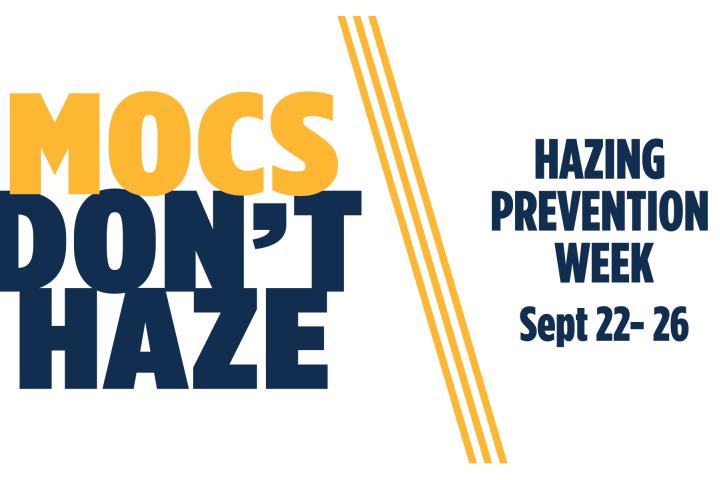Hazing Prevention
The University of Tennessee at Chattanooga is committed to creating and maintaining a safe and nondiscriminatory learning, living, and working environment.
Our focus is to prevent and eliminate hazing within our institution by educating students about the dangers of hazing. Through initiatives such as National Hazing Prevention Week, interactive workshops, and transparent reporting channels, we empower students to recognize, prevent, and speak out against hazing. Our goal is to foster leadership, teamwork, and friendships built on trust—not harm.
If you or someone you know is experiencing hazing, support and resources are available—because every MOC deserves to be treated with dignity and respect.
Are you or someone you know being hazed?
Click here to report a Hazing incident
Submit a report or contact Student Conduct at 423-425-4301 or [email protected].
What is hazing?
Hazing: Any intentional or reckless act on or off University-controlled property by one (1) student, acting alone or with others that is directed against any other student, that endangers the mental or physical health, safety, or welfare of that student, or that induces or coerces a student to endanger his or her mental or physical health, safety, or welfare. "Hazing" does not include customary athletic events or similar contests or competitions and is limited to those actions taken and situations created in connection with initiation into or affiliation with any organization.
Hazing Examples:
- Subtle Hazing
Hazing behaviors that are often less recognized, but still impact student mental or physical health such as, but not limited to: deception, assignment of demerits, silence periods with implied threats for violation, social isolation of new members, use of demeaning names, or expecting certain items to always be in one’s possession.
- Harassing Hazing
Hazing behaviors of harassment that endanger the mental or physical health, safety, or welfare of students such as, but not limited to: verbal abuse, threats or implied threats, asking new members to wear embarrassing attire, skit nights with degrading or humiliating acts, sleep deprivation, or sexual simulations.
- Violent Hazing
Hazing behaviors that physically harm students such as, but not limited to: forced alcohol or drug consumption, branding, forced ingestion of vile substances, water intoxication, sexual assault, abduction/kidnapping, or beating, paddling, or other forms of physical assault.
Applicable State Laws
- TN Code § 49-2-120 (2024)
(a) As used in this section, unless the context otherwise requires, "hazing" means any intentional or reckless act in this state, on or off LEA property, by one (1) student acting alone or with others, that is directed against any other student, that endangers the mental or physical health or safety of that student or that induces or coerces a student to endanger that student's mental or physical health or safety. "Hazing" does not include customary athletic events or similar contests or competitions and is limited to those actions taken and situations created in connection with initiation into or affiliation with any organization.
(b) The governing body of each LEA shall adopt a written policy prohibiting hazing by any student or organization operating under the sanction of the LEA. The policy shall be distributed or made available to each student at the beginning of each school year. During the first month of each new school year, time shall be set aside to specifically discuss the policy and its ramifications as a criminal offense and the penalties that may be imposed by the LEA.
Acts 2001, ch. 196, § 1.
- TN Code § 49-7-123 (2024)
(a) As used in this section, unless the context otherwise requires:
- (1) "Hazing" means any intentional or reckless act in this state on or off the property of any higher education institution by one (1) student acting alone or with others that is directed against any other student, that endangers the mental or physical health or safety of that student or that induces or coerces a student to endanger the student's mental or physical health or safety. "Hazing" does not include customary athletic events or similar contests or competitions and is limited to those actions taken and situations created in connection with initiation into or affiliation with any organization; and
- (2) "Higher education institution" means a public or private college, community college or university.
(b) Each higher education institution shall adopt a written policy prohibiting hazing by any student or organization operating under the sanction of the institution. The policy shall be distributed or made available to each student at the beginning of each school year. Time shall be set aside during orientation to specifically discuss the policy and its ramifications as a criminal offense and the institutional penalties that may be imposed by the higher education institution.
Acts 1995, ch. 500, § 1.
How to Report Hazing
Students:
- Online:
- In-person or via Telephone:
- Office of Student Conduct: (423) 425-4301 or [email protected].
- Office of the Dean of Students: (423) 425-4761 or [email protected]
- Department of Public Safety: (423) 425-4357 or [email protected]
- UTC Police Department: (423) 425-4357 or [email protected]
- Anonymous Reporting (online):
- Students are encouraged to provide as much detail as possible such as individual(s) or organization(s) involved, date, time, location, and any supporting evidence.
- Retaliation against individuals who report hazing violations in good faith is strictly prohibited and will be addressed as a separate conduct violation.
Employees:
- All university employees who witness, receive a report of, or have reasonable suspicion that hazing may be occurring or has occurred in the past, are encouraged to report the incident within 48 hours.
- All Campus Security Authorities (CSA) who witness, receive a report of, or have reasonable suspicion that hazing may be occurring or has occurred in the past, are required to report the incident within 48 hours.
- Reporting must be made in one or more of the following manners:
- Online
- In-person or via Telephone:
- Office of Student Conduct: (423) 425-4301 or [email protected].
- Office of the Dean of Students: (423) 425-4761 or [email protected]
- Department of Public Safety: (423) 425-4357 or [email protected]
- UTC Police Department: (423) 425-4357 or [email protected]
Investigation Process
For the investigation process for individuals and student organizations, please reference the UTC Student Code of Conduct at
Policy: https://www.utc.edu/sites/default/files/2021-03/studentcode_08-14-2020.pdf
Flow Chart: https://www.utc.edu/sites/default/files/2022-09/StudentConduct_ProcessFlowchart-Expanded_2022.pdf
Awareness and Prevention Programming
For Students
- First Year Students
All first-year students are invited to a hazing education, substance use education, and naloxone training occurring during First Flight, our pre-Welcome Week program prior to the start of the fall semester.
- Fraternity and Sorority Life
All members of fraternities and sororities must attend a hazing prevention presentation as part of Fraternity and Sorority Life’s Risk Reduction Series. This training is offered at least once in the fall semester and at least once in the spring semester.
- National Hazing Prevention Week
All students, including student organization leaders, are invited to attend the education sessions provided as part of the Hazing Prevention Week
Each September, the university organizes Hazing Prevention Week. This focused week of activities seeks to foster conversation across students, faculty, and staff to build awareness, educate about campus policy and reporting options, and reduce hazing behaviors. The week’s educational activities provide strategies for building group cohesion without hazing, bystander intervention techniques, and social norm messaging, among other evidence-based practices.
- Registered Student Organizations (RSO)
For registered student organizations (RSOs), the President or Vice President must attend a RSO Info Session once per year that provides an overview of the hazing policy.
- Athletics
Student-athletes receive notification of the hazing policy in the Student-Athlete handbook and it is covered in a mandatory fall meeting for all athletes.
- Bystander Intervention Training
The Center for Wellbeing provides hazing bystander intervention training for students by request.
For Employees
- National Hazing Prevention Week
A hazing prevention session is offered to all faculty and staff advisors for student organizations during Hazing Prevention Week.
Each September, the university organizes Hazing Prevention Week. This focused week of activities seeks to foster conversation across students, faculty, and staff to build awareness, educate about campus policy and reporting options, and reduce hazing behaviors. The week’s educational activities provide strategies for building group cohesion without hazing, bystander intervention techniques, and social norm messaging, among other evidence-based practices.
- Faculty and staff advisors for Registered Student Organizations
Faculty and staff advisors for registered student organizations receive a Clery Act compliance training that includes hazing reporting requirements for CSAs.
MOCS Don’t HAZE: UTC National Hazing Prevention Week
Monday, September 22
Social Media Day
Each council, chapter, registered student organization and all other campus stakeholders are encouraged to participate in the “Mocs Don’t Haze” social media campaign. Share Hazing Prevention Week graphics to spread awareness about the mission to end hazing.
Tuesday, September 23
Lupton Lobby Tabling 11am – 1pm
Information about events for the week, buttons, and education about hazing.
Wednesday, September 24
Lupton Lobby Tabling 11am -1pm
Information about events for the week and education about hazing.
Bystander Intervention Training focused on Hazing Prevention 12pm - 1pm University Center 3rd Floor, Chickamauga Room
Students are invited to attend this Hazing Prevention Week workshop to help learn ways to intervene to keep fellow Mocs safe from hazing.
Campus Community Presentation: 8:00-9:30 pm UTC Fine Arts Center Roland Hayes Concert Hall
Hazing Prevention Speaker- Dr. Lori Hart
Thursday, September 25
Campus Outreach Day 11am-1pm Lupton Hall 120, Student Activities Area, First Floor
We encourage each registered student organization and all campus stakeholders to participate in our Campus Outreach Day. Please stop by to sign our End Hazing banner and explore resources available on campus. Enjoy games and refreshments with the UTC Community.
UTC National Hazing Prevention Week Articles: MOCS Don't HAZE
SCHA Compliance Committee Reviewed and Approved: June 16, 2025
OGC Reviewed, Edited, and Approved: June 22, 2025
Document Subject Change


